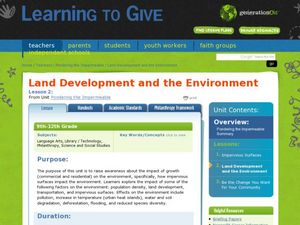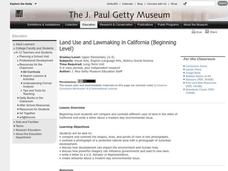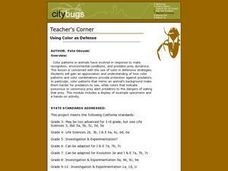Curated OER
SAVE OUR EARTH
Students research current environmental problems in order to develop and deliver an oral presentation. The presentation persuades the audience to act on the student's point of view on the issue.
Curated OER
COMPOSTING: WHY BOTHER?
Students explore the composting process and participate in a contest to make the most compost the fastest from the school's kitchen and yard waste.
Curated OER
Next Year's Seeds
Students play a game that demonstrates variables that affect farming. They write letters requesting free seed catalogs. They discuss the saying "A penny saved is a penny earned" in relation to what they learned from playing the attached...
Curated OER
Testing Your Water
Students perform several water quality tests on groundwater from their area. They use test strips to determine the pH, hardness, alkalinity, nitrates, iron and chloride levels.
Curated OER
How Long Until Dirt
Third graders examine the difference between composting and wasting food. They problem-solve what to do about leftovers after lunches so good food doesn't go to waste.They study food storage techniques that are environmentally friendly...
Curated OER
Coil-Built Pueblo Bowls
Use Native American tradition to create the context for making different cultural representations of pottery. Practice using geometrical shapes painted on the pottery, research different patterns found on Native American pottery, and...
Curated OER
Nerve Cell Informercials
Students research the structure and function of the nervous system. They prepare a model or representation of neural transmission. Students create an infomercial about nerve cells.
Curated OER
Making a Mini Worm Habitat
Students explore the process of converting organic waste into usable fertilizer. They observe how living and nonliving things interact with one another by making a mini-worm habitat.
Curated OER
Salt Marsh in a Pan
Students create a model of a salt marsh to discover the impact of pollution and human activities on water-based habitats including bays and the ocean. They recognize the relationship between natural and developed areas. Students impact...
Curated OER
Modeling the Rock Cycle
In this modeling the rock cycle worksheet, learners use a sugar cube to show the phases and changes in the rock cycle as represented by the changes in the sugar cube. For each step of the experiment students indicate the part of the rock...
Curated OER
Rock Cycle
In this rock cycle worksheet, students simulate the changes that occur during the rock cycle using a sugar cube. They use the sugar cube to represent a rock and perform changes on the sugar cube that represent the stages of the rock cycle.
Curated OER
Land Development and the Environment
Learners examine the relationship between land development and the environment. In this environmental stewardship lesson, students explore how population density, land development, transportation, and impervious surfaces take their toll...
Curated OER
Scooting Along!
Students investigate how Newton's Third Law affects vehicle design. In this Newton's Third Law instructional activity, students use a web site to research Newton, his third law, and how to design a vehicle that uses a balloon for power....
Curated OER
Compost in a Bag!
Fourth graders experiment to see which objects decompose. In this compost instructional activity, 4th graders observe the changes of labeled objects in a bag. Leave the objects for one month and record the changes by observation and...
Curated OER
Those Amazing Earthworms- A Worm's World
Students investigate earthworms. In this organisms lesson, students observe earthworms in their environment and record their behavior towards light and how they eat. Students continue on a month long observation.
Curated OER
Land Use and Lawmaking in California
Students investigate the laws of using land. In this California Government lesson, students examine the many uses of land in California and find an environmental issue they care about. Students write a letter to a politician...
Curated OER
Disposing Garbage
Students explore environmental cleanliness by completing a worksheet in class. In this waste management lesson, students identify the technological advances in society and how they increase waste production our planet is unable to deal...
Curated OER
Biodiesel: An Alternative Fuel Source
Students explore the advances that are being made in alternative fuels.In this biodiesel instructional activity students evaluate different petroleum and alternative fuels.
Curated OER
Water Cycle (Grades 2-4)
Students demonstrate their understanding of the water cycle and how it effects the environment by graphically depicting and describing the water cycle.
Curated OER
Using Color as Defense
Learners explore mimicry and crypsis, participate in hands-on predator-prey activity, and practice calculating averages and graph results in histogram.
Curated OER
The Electric House Project
Students design and build a foam core house which has a light in each room. They demonstrate an understanding of series, parallel, and complex circuits. They complete a worksheet, in complete, sentences expressing these electrical concepts.
Curated OER
It's all In the Package
Students examine the concept of reducing solid waste and how it relates to product packaging. They read about and evaluate the packaging decisions of two major U.S. corporations, develop a t-chart comparing the pros and cons of various...
Curated OER
First Grade, First Grade, What Do You See?
First graders read the book "Brown Bear, Brown Bear, What do you see?" by Bill Martin, Jr. and work cooperatively to create an online book about their geographic region. Books can be posted on the internet with other books from around...
Curated OER
Maracas
Students create Maracas out of various supplies while learning about percussion instruments in this Art and Music lesson for the elementary and middle level classroom. Detailed directions for two different methods are given.

























